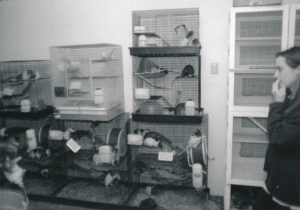 Diane, founder of Rattie Ratz, in our "rat room" circa 2003 Diane, founder of Rattie Ratz, in our "rat room" circa 2003 November is a special month for me because it is my birth month and it also happens to be the month that, I feel, Rattie Ratz was born. In this month, 20 years ago, I got myself some pet rats for my birthday. I had spent a reasonable amount of time researching companion pet options and, at that time in my life, some sort of rodent seemed like the best option and I ended up adopting 3 adult female rats from the Peninsula Humane Society. What began as a “pet project” to document my experience with rats turned into Rattie Ratz and is now a thriving organization dedicated to the rescue and rehoming of deserving pet rats all over Northern California. I am often contacted by people from other areas who would like to launch similar rescue organizations to service domestic pet rats and other animals in their region so I feel it is very apropos to use this month’s blog to discuss giving back and starting your own rat rescue. I will start off by saying that I will not be sugar coating or glorifying this endeavor in any way. Animal rescue work is hard, emotionally draining, time-consuming, and expensive. If this is truly your passion and something you are meant to do, it will also be exceptionally rewarding and could easily be or become one of the best experiences of your life. Choosing to rescue animals is absolutely a job. Rattie Ratz is an all-volunteer organization and none of us are being paid for the hours that we put into the rescue. This is how Rattie Ratz has always been able to sustain itself and provide for the animals in our care. As a responsible animal rescuer, you need to be able to identify and set your limits and boundaries. For me, I didn’t wake up one morning and decide that I wanted to start a rat rescue. The idea was planted shortly after getting my first 3 rats and quickly evolved into a mission. In the beginning, it was *just* me. Me, one cage, and 3 adult girls that I rescued from a shelter. Then someone reached out to me directly because they needed to find a new home for their girl. Well, what’s 1 more when I have 3 and girls get along pretty well anyway so, why not? Sure, I’ll take in your girl. Then, someone needed to rehome their boys. That’s ok, I’ll just set up a second space so they stay separate. No problem. Not too long after, I found myself with a room full of rats and someone suggesting that I try to find *other* homes for them. Voila! Rattie Ratz was born. 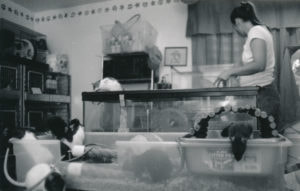 Play area in the "rat room" circa 2003 Play area in the "rat room" circa 2003 I still started as an army of one. I was going to college full-time, working part-time, and trying to figure out how I was going to find *other* homes for all these rats. Thankfully, with the internet in full bloom now, it’s MUCH easier to find potential homes but, when I began in 1998, things were a lot different. I worked part-time at Pet Food Express and held informational events and started adoptions through their Redwood City, CA location. Animal adoptions were basically handled on a donation basis and no, the money I raised definitely did NOT sustain the animals in my care. When I began, I was limited by my available space, time, and financial resources since I was basically bankrolling the rescue as a hobby of mine. Soon, I had patrons who couldn’t adopt but wanted to help and would donate money to help pay for the supplies I needed. Eventually, one suggested that I should look into becoming a non-profit so she could deduct her donation from her taxes and she gifted me the Nolo book on how to start a non-profit in California and I set out to make that happen. Finally, in June of 2002, Rattie Ratz was incorporated as a bonafide 501(c)3 organization. The jagged truth about pursuing a passion like this is that it will, absolutely, cost money and, potentially, quite a bit of it. If you are thinking about starting your own rat rescue, or any animal rescue for that matter, you must accept the brutal fact that you will not be able to save them all. After doing this for 20 years, I feel like many people have to learn this very basic fact the hard way. I know I learned it the hard way. I feel there is a very fine line between being a well-intentioned and responsible animal rescuer and being a well-intentioned and irresponsible rescuer. Knowing your limits, accepting your limits, and sticking to your limits is absolutely paramount. I’ve witnessed rescuers get in way over their heads and the animals suffer. You won’t be able to save them all but the ones that you are able to help will reward you with “happily ever after” experiences. So…you want to give back to your local community and start a rat rescue in your area. I would highly suggest starting small and focus on iterative and controlled growth so things don’t escalate out of control. This is how I started and, if I were to do it all again, I would do it the same way. Start by taking in needy animals. Take care of them religiously and begin to figure out where your limits and boundaries are. The biggest limitation, at least here in the bay area, is space. I rent and space out here is insanely expensive. Even if time and finances weren’t other limitations, there is only so much space available. I feel it is very important to maintain animals in a kind and loving, home-like environment. This is why Rattie Ratz operates from a network of foster homes. We don’t have a central facility for the rescue. One, that would be cost-prohibitive and two, my intention was to start a rescue, not an institutionalized animal shelter. My goal was to rescue animals in need and provide loving, home-based care until they could be properly placed in another permanent home. We are all rescue foster homes so I don’t intend or expect our care and spaces to be the same as what we would expect from our adopters *but* I do intend for each and every animal in our care to have adequate space and comfort. Depending on your situation, you may choose to have a certain brand/model of cage but, over the years, I have used A LOT of different set-ups and have come to the definitive conclusion that Critter Nation cages from Midwest are the best and most versatile cages for anyone wanting to pursue rat rescue. You should absolutely upgrade to the stainless steel replacement pans from Bass Equipment Supply as well. I know that is a costly upgrade but it is well worth the initial investment for the long haul. 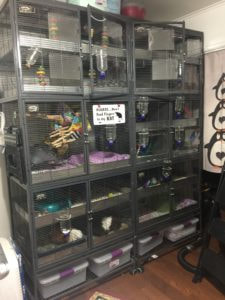 Current cage space, circa 2018 Current cage space, circa 2018 I am one person and I am the primary intake home for the Rattie Ratz foster network. I won’t go into detail about what that is exactly but I have 3 triple Critter Nations in operation right now. I am lucky enough to have a very talented domestic partner who has done some major modifications to my current spaces but, even without the modifications that I am blessed to have, 3 triple nations can easily be divided into a total of 12 spaces measuring about 1’ tall by 3’ wide by 2’ deep. That’s a 6 sq ft space. For permanent homes, more space is always better and preferred but, when running a rescue operation, you try to make the most of what you have. That being said, my bare minimum is 1 sq ft per rat so, in an emergency situation, I could potentially fit 6 rats in each of the 12 spaces and that’s 72 rats!! Now, please don’t misunderstand me, this is NOT my recommendation. This is a possibility in an emergency situation. 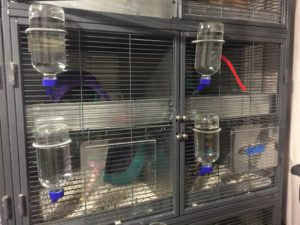 The "apartments" for solo males waiting for castration. The "apartments" for solo males waiting for castration. More typically, we have 2 sq ft per rat so each space would hold 3 rats for a total of 36 rats – that’s still quite a few rats for one person to care for an maintain especially when you consider that practically all of our volunteers (myself included) have full-time jobs in addition to the volunteer work that we do for Rattie Ratz. I also choose to keep my spaces as uniform as possible with easy to clean accessories like glass water bottles, ceramic or stainless steel food bowls, pelleted paper bedding, a plastic space pod, a hanging chew toy, and possibly something like a hammock depending on the time I have to do laundry. For an individual person with a full-time job, I wouldn’t suggest any more than what I have set up because I know how much work that is! When I was a stay-home mom, I had a lot more time to maintain the rescue animals but I also had a very nicely converted 1 car garage and 2-4 regular volunteers who would come to the garage to help maintain the animals on a regular basis. This was WAY before the advent of Critter Nations and we were using Martin’s Cages (which are still great options) and, at our peak, we easily had 300+ rats in our care. Would I go back and do that again? Maybe, but, probably not. The converted garage was nice and home-like with insulated sheetrock walls, a ceiling, electrical, water, a window, the garage door, and cheap carpet BUT, it was still a garage. It’s not where the family lived or even hung out. People would be there to maintain the animals and perform adoptions and intakes but, in the sense of daily socialization, it was definitely not a home-like environment. Right now, I have my room with the rats, my sewing space, and a few others things. It’s a modest room and the 3 nations reside on one wall. I’ve absolutely maximized the space to be able to accommodate as many rats as I can but I still set limits. I don’t allow extra or overflow cages because that is a very slippery slope. IF I break that boundary and have an extra cage, it MUST stay in that room because my partner set the boundary of rats only being in my room and I appreciate my relationship enough to adhere to that limitation. Limitations and boundaries are the absolute most important consideration when you choose to pursue animal rescue. You don’t want to get in over your head and force the animals in your care to suffer. You don’t want to get to that borderline hoarder status where you have so many animals in your care and not enough volunteers/resources/etc to maintain them all the way they should be maintained. You don’t want to gain a reputation for being “that crazy rat rescue person.” 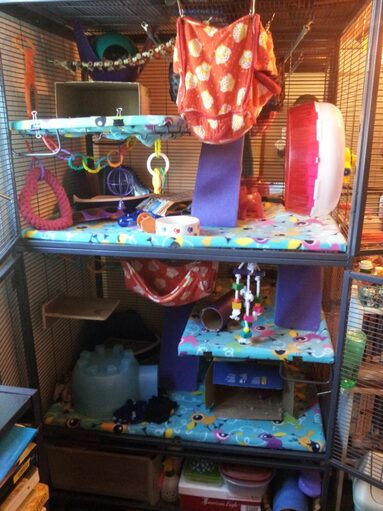 Example of an ideal rat space Example of an ideal rat space I’ve seen horrible situations where well-intentioned rescuers go beyond what they can handle and the resulting situation is depressing and devastating. Overcrowding, rampant illness, plenty of death, and sometimes worse. Rescue work is full of heart-wrenching situations and some very difficult decisions. It is not all peachy keen. Rescue work is a labor of love that can definitely be as gut-wrenching as it is rewarding. It is *not* for everyone. Limits and boundaries are your friends! For a hot minute, Rattie Ratz expanded to also try to help mice and hamsters and I quickly realized that those animals were not for us. We quickly reverted back to focusing exclusively on domestic pet rats and I, for one, haven’t looked back. I have a lot of admiration and respect for organizations that can provide aid to a more varied and diverse number of species but, for Rattie Ratz, I feel specializing was the best choice. Specializing in rats has given us a wealth of very specific experience with rats and, with that very specialized experience, we are in the best position to really support and empower our adopters. Rattie Ratz isn’t just a rescue organization, we’re an organization that mentors, enables, and empowers people to be the best rat parents they can be. I know I founded this organization but it’s really all of the dedicated volunteers over the last 2 decades that have nurtured and developed this organization into what it is today. I am exceptionally proud of everything that we have accomplished and appreciative of all the individuals who have helped along the way to make Rattie Ratz such an amazing organization. If you want to start a rat rescue in your area, I very much encourage you to do so! Give it thought and consideration. Be honest with yourself about your limits and boundaries. The great thing about being a rescue is that you can be as big or as small as you want to be. In this circumstance, bigger is not always better! Consider the animals and do what is best for them. Consider emergency situations, like fire, and whether you would be able to safely and effectively relocate all the animals in your care. Think about your own mortality and whether systems and processes are in place for the animals in your care in the event that you aren’t able to return to care for them. Think about your financial resources and your ability to provide proper medical care. I feel the goal of an independent animal rescue or rescuer should be to provide assistance to as many animals as you can in a well-maintained, safe, and healthy manner. If you are acting responsibly and properly caring for all the animals you have committed to rescue, people will be inspired and will want to help you. This has been my experience and I hope it helps others who may be inspired to start rescue organizations of their own.
0 Comments
|
AuthorDiane Weikal, founder of Rattie Ratz, wrote this monthly blog in celebration of our 20th anniversary of rescuing rats! Archives
December 2018
Categories |
|
© Copyright 2024 Rattie Ratz
California Registered Public Benefit Org United States Tax Exempt Organization 501(c)(3) IRS FEIN #94-3400283 |

 RSS Feed
RSS Feed